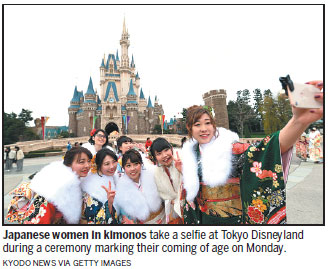
City and town hall ceremonies, shrine visits and wild parties. With laughter and tears, Japan’s 20-year-olds celebrated after officially becoming adults on Monday.
The country’s Coming of Age Day, which is observed on the second Monday of January, is a national holiday for the rite of passage.
Anyone who turned or turns 20 between April 2, 2017 and April 1, 2018 was invited by his or her hometown’s authorities for a congratulatory ceremony, followed by a visit to the local shrine and a full-on night out with friends.
Preparations for the day started early, especially for the girls, who spent hours fixing their hair, makeup and kimonos. Beauty salons stayed open all night on Sunday to meet the rush for styling.
The Coming of Age Day is supposed to remind Japan’s young adults, who begin to have newfound liberties such as being able to drink, smoke and drive, to join society as self-reliant and responsible individuals.
Japan’s Ministry of Internal Affairs and Communications predicted that 1.23 million 20-year-olds were welcomed into the ranks of adults by Jan 1, compared with the record 2.5 million postwar baby boomers who reached adulthood in 1970.
Other large groups, the children of the original baby boomers, came of age between 1993 and 1995 – about 2 million a year.
A declining birthrate has led to a downward trend.
The National Institute of Population and Social Security Research has estimated that the number of the 20-year-olds will dwindle to 1.08 million in 2025.
An annual survey conducted by Japan’s matchmaking company O-net of 600 fledgling adults before Monday’s coming-of-age ceremony showed that 62 percent of the interviewees were in a romantic relationship. More importantly, 83.8 percent of them wanted to marry.
O-net concluded that Japanese youth may no longer live as “herbivores” who shun sex.
However, while they may have romantic interests, many are not confident in their country.
A record low 54 percent of the new adults nursed a dream, according to a survey by Macromill in December. The annual poll the Japanese research organization has done since 2008 also showed that only 34 percent deemed Japan’s future bright.
And 48 percent of Macromill’s interviewees were anxious about application of new technologies such as artificial intelligence.
A survey conducted by the Mainichi Shimbun in December showed that almost half of 121 major Japanese companies said they have already introduced or plan to apply AI into some of their operations.
Japan’s parliament revised the Public Offices Election Law in 2015, lowering the voting age from 20 to 18. The government is also seeking to lower the legal age of adulthood to 18.


